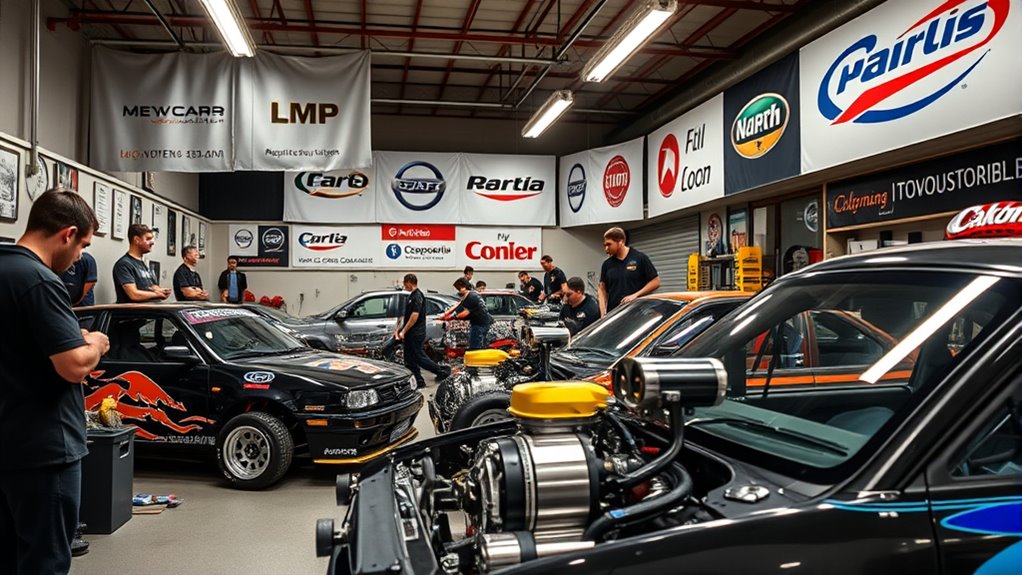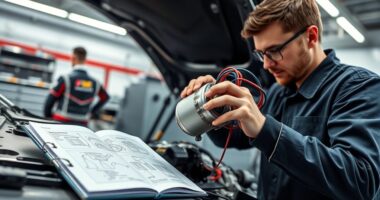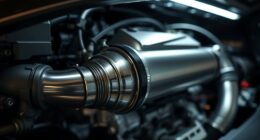Car tuners often face strict legal challenges from agencies like the EPA, which target illegal emissions modifications. Small shops receive hefty fines for using or selling non-compliant parts, pushing them to remove risky products and limit services. Larger companies adapt by developing compliance strategies and documentation protocols. Industry shifts focus on legal risk management, with many shops now operating within tight operational restrictions. To protect your business and stay compliant, there’s more valuable insight ahead.
Key Takeaways
- Small tuning shops face legal risks from EPA enforcement targeting illegal emissions modifications, risking hefty fines and business closure.
- Industry leaders mitigate legal exposure by removing non-compliant products, investing in legal infrastructure, and emphasizing compliance.
- Enforcement actions often involve detailed documentation and testing to defend against claims of illegal vehicle modifications.
- Regulatory pressures lead shops to restrict services, refuse street vehicle modifications, and focus on legal, compliant tuning operations.
- Proper customer communication, thorough record-keeping, and operational restrictions are essential strategies to manage legal challenges.
The Origins and Growth of PFI Speed

Founded in 1995 as Parts Finder International in Frederick, Colorado, PFI Speed began by sourcing JDM Honda parts from junkyards. You quickly notice how the company’s focus on automotive parts shifted toward performance upgrades as founder Brent Leivestad gained a reputation for in-house tuning. His work on a hot-rod Honda CRX and the use of a dyno showcased his commitment to performance enhancements. PFI Speed’s social media presence and YouTube channel helped build a dedicated following among enthusiasts, fueling growth in the aftermarket scene. The shop expanded its services to include custom tuning and performance upgrades, becoming a notable player in the automotive industry. Their success is rooted in a passion for performance-driven builds and engaging with the enthusiast community online.
The EPA’s Initial Contact and Documentation Demands

In December 2020, Brent Leivestad received a letter from the EPA demanding detailed documentation of PFI Speed’s vehicle builds and parts sold, including photos and contact information. This initial contact appeared to be a standard audit, but it carried serious implications under the Clean Air Act, especially concerning aftermarket parts and tuning. You realize the importance of thorough compliance, so you begin gathering extensive records, such as parts lists and photographs. The process is labor-intensive, taking several months, but it’s vital to demonstrate adherence to EPA regulations. Proper compliance documentation is essential in managing regulatory scrutiny, as understanding emissions standards can help avoid violations and protect your business interests. Additionally, maintaining detailed records can serve as a defense strategy if legal challenges arise, ensuring you are prepared to substantiate your compliance efforts and mitigate potential penalties.
Enforcement Actions and Penalties Against Small Shops

After the EPA’s initial documentation requests, small tuning shops quickly find themselves facing serious enforcement actions. These actions include hefty fines for selling emissions-related parts, with amounts ranging from $4,223 to $8,500 for shops like Evans Tuning, PSI Performance, and Weistec Engineering. Larger penalties, such as $100,025, have been issued to businesses like More Power Tuning for non-compliance with environmental regulations. Enforcement actions mainly target small shops selling off-road or competition parts that are illegally used on street vehicles. Many small shops lack the legal resources to effectively contest these fines, making them especially vulnerable. The EPA’s strict stance has resulted in a pattern of significant penalties and legal pressure on small, family-run automotive support businesses, threatening their survival. Resources for legal support can help these businesses navigate complex regulatory challenges, especially considering the regulatory enforcement pattern observed in recent cases. This situation underscores the importance of understanding the legal landscape surrounding aftermarket automotive parts and the need for proactive compliance measures. Additionally, some shops underestimate the importance of compliance with regulations and the potential consequences of non-adherence, which can be detrimental to their operations. Recognizing the specific regulations applicable to aftermarket parts can significantly reduce the risk of future penalties.
Strategies and Legal Stances in EPA Litigation

You need to understand how the EPA’s enforcement tactics influence your legal options, especially when defending against fines or restrictions. Small shops often rely on legal strategies like challenging jurisdiction or proving off-road use to counteract agency actions. Meanwhile, industry responses, such as removing risky parts, show how manufacturers adapt their legal stances to minimize exposure. Incorporating expert voice actors can also help in creating compelling educational content to navigate these legal challenges more effectively. Staying informed about emerging sneaker trends and consumer preferences can further empower legal strategies, ensuring compliance while maintaining market relevance. Additionally, understanding the risks associated with merchant services can help businesses develop comprehensive approaches to regulatory and security challenges. Recognizing how dog names influence branding and customer engagement can offer additional strategic advantages for businesses in related industries. Furthermore, knowledge of ethical hacking principles can aid in assessing and strengthening compliance measures against cyber threats.
EPA Enforcement Tactics
The EPA employs a combination of strategic enforcement tactics and firm legal stances to regulate aftermarket automotive parts. Their enforcement actions often target small shops like PFI Speed, issuing hefty fines—such as the $18,000 penalty for selling Hondata S300 units—and threatening much larger penalties. The EPA mainly focuses on aftermarket parts found on street vehicles that are marketed as off-road only, asserting that using these parts on roads breaches the Clean Air Act. While they acknowledge no exemption exists for competition vehicles, enforcement discretion influences how aggressively they pursue small tuners. Larger companies, like Cobb Tuning, respond by removing products from catalogs to reduce legal risks. This approach underscores the EPA’s strategic, sometimes cautious, enforcement tactics in controlling aftermarket parts sales. Additionally, the EPA’s regulatory strategies often involve monitoring and adjusting their enforcement priorities based on legal and political considerations. Understanding the legal landscape and the compliance requirements is crucial for aftermarket tuners to navigate potential challenges effectively. Recognizing the importance of cybersecurity measures can also help protect sensitive business data from potential cyber threats that could complicate legal compliance efforts. Incorporating mindfulness practices into legal planning could enhance decision-making clarity and reduce stress during complex regulatory negotiations. Staying informed about evolving regulations and legal precedents can further help aftermarket tuners adapt to changing enforcement environments.
Legal Defense Strategies
When facing EPA litigation, shops must adopt strategic defense tactics to protect their operations. A strong legal defense often involves demonstrating that your activities are limited to off-road or competition use, supported by evidence like trailers, non-DOT tires, and racing modifications. Maintaining thorough documentation of testing procedures, including dyno results and quality control measures, helps prove compliance with industry standards. You can also challenge EPA claims by arguing that certain aftermarket parts or tuners qualify for exemption under the Clean Air Act for competition purposes, though enforcement discretion is limited. Focus on asserting that your operations don’t considerably contribute to emissions violations or that enforcement actions are overly broad. Collaborating with industry associations and experienced environmental counsel strengthens your legal defense and clarifies complex regulations. Additionally, participating in remote hackathons can foster innovative solutions and collaborative strategies for compliance and legal challenges. Understanding regulatory compliance requirements and staying informed about recent legal developments can further bolster your defense strategies and ensure your operations remain within legal boundaries. Incorporating industry-specific standards and best practices can also help demonstrate your commitment to lawful operation and environmental responsibility. Being aware of affiliate disclosure requirements and maintaining transparency can further support your case by showing your commitment to ethical practices. Moreover, employing sound therapy techniques such as auditory feedback can assist in training personnel to recognize and adhere to compliance protocols more effectively.
Industry Response Measures
In response to increasing EPA enforcement, many aftermarket shops are adopting proactive strategies to safeguard their operations. The industry response emphasizes legal compliance by limiting services to vehicles that meet regulations, such as accepting only towed cars with dedicated ECUs. Larger companies proactively remove non-compliant parts from catalogs to reduce legal risks and avoid fines. Shops are implementing strict documentation and testing protocols, like dyno break-ins, to demonstrate adherence to regulations and minimize liability in enforcement actions. Industry support networks advise shops to keep tuner identities confidential and operate within legal boundaries to avoid scrutiny. This cautious approach mainly targets small, family-run shops lacking extensive legal resources, reflecting a collective effort to navigate evolving regulations and protect their businesses from potential EPA litigation.
Operational Restrictions and Industry-Wide Impact

Regulatory pressures have forced car tuners to implement strict operational restrictions, fundamentally changing how they do business. You now face regulations that demand rigorous compliance, leading many shops to limit services and avoid certain modifications. PFI Speed, for example, refuses to work on street vehicles, only accepting towed cars with dedicated ECUs to dodge EPA violations. The EPA’s enforcement tactics have caused numerous small tuners to remove parts from catalogs or stop offering certain products altogether, fearing legal repercussions. Many shops face fines from thousands to over $100,000, making it difficult for small businesses to survive. Larger companies are also adjusting by removing parts and altering offerings to reduce legal risks. Overall, industry-wide, these regulations have shifted focus from service expansion to strict compliance, drastically restricting aftermarket tuning.
The Role of Larger Companies and Industry Adaptation

Larger companies like Cobb Tuning are actively adjusting their product lines to avoid legal issues and EPA fines. You’ll notice industry-wide shifts as these firms implement policies that restrict emissions-related parts and focus on off-road or exempt applications. Their legal resources set industry standards, guiding smaller shops to navigate compliance more effectively.
Corporate Legal Strategies
As industry leaders like Cobb Tuning and FuelTech respond to tightening environmental regulations, they proactively restrict or remove certain products from their catalogs to avoid fines and lawsuits. Their corporate legal strategies focus on building a robust compliance infrastructure that helps navigate complex environmental laws. By investing in legal teams and staying ahead of regulatory changes, these companies set industry standards for responsible product offerings. Smaller shops often follow suit, adopting operational restrictions to align with these legal precautions and reduce liability. Larger firms influence industry practices by establishing legal precedents through cautious product development and public stances on emissions. This proactive approach ensures they maintain market access and avoid costly legal battles, shaping the industry’s overall legal landscape.
Industry-Wide Compliance Shifts
Industry leaders like Cobb Tuning are setting the tone for widespread change by proactively removing certain aftermarket parts to steer clear of EPA fines and legal trouble. This move highlights how industry compliance is now a top priority, prompting larger companies to adapt quickly. Smaller tuning shops, lacking the legal resources, often follow suit or face increased risks. Industry-wide shifts are driven by EPA enforcement actions targeting aftermarket parts, pushing firms to preemptively remove products and tighten operational restrictions. This environmental push encourages companies to focus on legal risk management and compliance protocols. Many major firms are collaborating with regulators and industry associations, helping develop standardized compliance practices. These efforts are shaping industry standards, reducing the availability of certain modifications, and emphasizing the importance of adherence to regulatory demands for long-term sustainability.
State-Level Enforcement and Its Effects on Shops and Owners

State agencies like the New Jersey Department of Environmental Protection actively track and penalize modified vehicles, often using vehicle registration data and online forums to identify non-compliant cars. As a vehicle owner, you face fines, fix-it tickets, or even jail time if caught operating illegal modifications. This enforcement mirrors federal tactics, increasing pressure on small tuning shops and individual owners alike. Penalties often target those operating without proper documentation or selling parts enabling street use of emissions components. Imagine the following:
| Vehicle Owner | Enforcement Action | Potential Consequence |
|---|---|---|
| Small shop | Citations | Fines, license loss |
| Owner | Fix-it tickets | Restricted registration |
| Support network | Legal notices | Business closure |
These strict measures create a highly restrictive environment, making compliance more complex and threatening the viability of tuning businesses.

Charting the future of automotive tuning means facing increasing regulatory uncertainty, as government agencies continue to tighten restrictions without clear guidelines for aftermarket parts and modifications. The regulatory environment remains unpredictable, with agencies like the EPA cracking down on small shops through fines and investigations, signaling a tougher stance. Without explicit exemptions for competition vehicles, long-term planning becomes challenging, and enforcement may intensify, increasing legal risks. Industry experts expect expanded scrutiny, especially targeting small businesses that support larger companies. To navigate this uncertain future, you must prioritize compliance by adopting thorough documentation practices and staying informed on evolving regulations. Proactively adapting your operations now will help you better manage the risks and ensure continued viability amid tightening restrictions.
Lessons Learned and Best Practices for Tuning Businesses

Overcoming regulatory challenges requires tuning businesses to adopt proven strategies that minimize legal risks and protect their operations. Implementing best practices like thorough documentation of testing procedures, such as in-house dyno testing, helps establish liability and defend against emissions or engine failure claims. Communicating clearly with customers about vehicle limitations and avoiding work on street-legal vehicles can reduce regulatory risks. Maintaining comprehensive records, including failure reports and customer interactions, enhances legal protection. Carrying liability insurance and adopting strict operational restrictions—like refusing to modify street vehicles—further safeguard your business. Staying proactive with compliance, establishing detailed contractual terms, and maintaining transparency are essential in navigating increasing regulatory scrutiny. These practices help mitigate risks and ensure long-term stability for your tuning operations.
Frequently Asked Questions
Why Are Tuned Cars Illegal?
You might wonder why tuned cars are illegal. When you modify your vehicle’s engine or emissions system, you could disable or bypass factory controls, causing it to emit more pollutants. Many tunes aren’t EPA-approved and violate laws like the Clean Air Act. Regulatory agencies actively enforce these rules, and if your car exceeds pollution limits because of unauthorized modifications, it becomes illegal to operate on public roads.
What Are the Risks of Tuning Your Car?
Tuning your car comes with significant risks. You could face legal trouble if your modifications violate emissions laws or safety standards, leading to fines, vehicle impoundment, or even legal action. Additionally, illegal tuning might void your warranty and cause engine damage or failures. You also risk losing your registration or facing enforcement actions from authorities like the EPA. Overall, these risks can cost you financially and legally.
Is the EPA Going After Tuners?
Think of the EPA’s actions like a tightrope walker, carefully balancing enforcement and regulation. Yes, the EPA is actively going after tuners, especially small shops, with fines up to $180,000 and demands for detailed info. They target vehicles even if marketed for off-road use, making it risky for tuners to modify or sell parts. Smaller shops feel this pressure most, often removing parts from catalogs to avoid legal trouble.
Why Can’t Cars Be Tuned?
You can’t tune cars legally because modifications that increase emissions violate federal and state laws. Using aftermarket parts like ECU flashers or chips often breaches the Clean Air Act, risking fines and legal trouble. Regulatory agencies, like the EPA, actively target tuners and shops that sell or install these illegal parts. To avoid penalties, you must guarantee any tuning keeps your vehicle compliant with emissions standards and local laws.
Conclusion
Managing legal challenges in car tuning can be tough, but remember, “forewarned is forearmed.” Staying informed about regulations, maintaining transparency, and seeking legal advice can help you adapt and survive in this evolving landscape. While authorities tighten restrictions, your ability to innovate responsibly will set you apart. Keep learning from others’ experiences, and don’t let setbacks define you—run your business with integrity and resilience.










